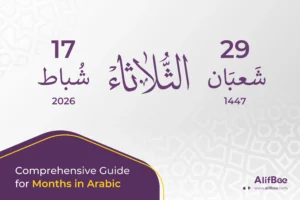The best guide to Arab etiquette
When you are planning on moving or traveling to an Arabic country in the Middle East, the first thing you will think about is learning the Arabic language. The Arabic language is the key to communicating with locals. It is important if you are a student or an employee.
The thing is that a lot of people underrate the power of learning about the etiquette and traditions of the country they are going to. Knowing the appropriate thing to do plays an important role in communication. In fact, sometimes this can be even more important. Because what is the point of knowing the right words to say when you say them with disrespect?
Here in this article, we will try to help you know more about the etiquette in the middle east and help you avoid any deed that can disrespect natives.
What is etiquette in Arabic?
Do you remember how your parents used to tell you as a child to do and avoid certain things because they are rude? There is a tiny problem, which is that following this list you were given in the past is not going to help you always.
When you move to another country or other community, you will notice that there are different traditions. What is accepted in your home may be considered rude elsewhere and what you see as rude may be the norm for others.
This applies to all the countries and cultures, and the Arabic world in the middle east is not an exception. Therefore, you have to learn the cultural norms in the Arabic country you are going to visit in order to act appropriately.
Another important thing to keep in mind is that etiquette should not only consider words but also nonverbal behavior as well. Sometimes, an innocent gesture could be more offensive than a thousand words.
You will have to deal with locals every day. They may be your neighbors, your boss, customers, or even your friends. Now when you do not know how to show your respect, you will be able to make friends or have a successful business.
Now, here are some of the etiquettes you need to know about.
Middle Eastern etiquette
All Arabic countries have a more conservative culture, making it vital to maintain good behavior and show good manners. Etiquette rules often vary depending on who you are dealing with and the situation, but there are some general guidelines you should know about.
Do not show the soles of your feet when sitting
In the Middle East, the soles of the feet are seen as dirty, and it is common for Arabic natives to feel offended if someone faces their feet towards them. This applies even when the feet are clean because it is not about cleanliness.
When sitting cross-legged, ensure your feet or the soles of your shoes are not facing anyone. If they are, adjust the way you sit.
Use the proper title when addressing someone
Arab people appreciate being addressed with the correct title, as it expresses respect. When addressing someone you do not know, you can use their name with the word “Sayyid,” which means “Mr.,” or “Sayyidah,” which means “Mrs.”
When addressing colleagues, it is common to use the name of their eldest son along with the word “Abu.” For example, “Abu Rami,” which means “father of Rami,” is quite acceptable in the Arabic world.
Many seniors prefer to be addressed with the word “Shayekh” before their name, but it is sometimes acceptable to use “Abu …” especially if they are friends. Additionally, you must use the word “Haj” for those who have completed the pilgrimage to Mecca.
When Arabic people introduce themselves or others, they usually provide the correct title to use. Try to remember and use it.
Use Appropriate language in public
In the last few years, it has become customary to curse and use offensive words publicly in some Western countries. In the Middle East, this is still not the norm. Cursing in public is always seen as impolite. You should avoid using harsh language when talking to others whether they are strangers or people you know.
In fact, some countries made it illegal to curse or swear openly in public. This means that doing so could lead to being arrested or maybe paying a fine.
Dress modestly, especially in religious places
There is no unified dress code in Arabic countries. Sometimes, you may have different dress codes in the same country. However, to be safe, always dress modestly and try to find out what is acceptable in the area you are visiting beforehand.
In religious places, you will always be asked to dress modestly and cover your body. Men and women are not allowed to wear revealing clothes there. Sometimes, women are given something to wear over their clothes to cover themselves.
Do not show intimacy outside the house
In the Arabic world, intimacy and affection are considered private things. They are supposed to be shown behind closed doors, not in public. Avoid kissing or hugging in public places because this can be seen as a disrespectful act in many counties. Sometimes you can be fined for that.
Arabic culture rules when visiting
Arabic people are known for their hospitability and kindness with friends and guests. When you live in an Arabic country, you will get an invitation from your Arabic friends and colleagues to visit them in their houses.
Now when you accept the invitation and go there, keep in mind that Arabic people value privacy in their homes and have certain rules that need to be followed whether you are a guest or a local. Here are some of the important rules to keep in mind:
Your shoes must stay outside of the house
Shoes are dirty, and walking with shoes on inside the house will soil the floor and/or the carpets. When you enter the house, the first thing you should do is to take off your shoes and ask your host where to put them. Sometimes, you will be given clean slippers to put on while in the house. At other times, the floor will be covered with carpets, so it will be OK to walk barefoot.
Remember to wear clean socks when visiting someone, because you are more likely to take your shoes off.
Say hello to everyone you meet
When you meet someone in the house you are visiting, you should greet them to show your respect. Sometimes, it is better to shake hands with every one of them.
Wait for the host to offer you a seat
When visiting Arabic friends, you should follow them and wait till they ask you to sit. Many Arabic houses are designed to have a special room with better furniture for guests to show the guests that they respect them and want to be hospitable and kind.
Try not to praise a particular object in the house too much
Even if it is polite to compliment nice objects people have in their homes, doing this excessively with an Arabic person is different. When you praise a particular item in the house, they may feel obliged to give it to you.
Greetings in Arabic culture
Greeting is always the first thing you do when you meet someone anywhere in the world. The greeting can be a key to communication and connecting people. It can help you show others that you respect them and care about them.
In the Arab world, the greeting is as important. However, there are some aspects that you need to consider when greeting.
Greet everyone
When you visit someone in their home, it is important to greet everyone there. It is preferred to greet them with a smile and a handshake. Using the right hand to greet is vital. Therefore, you should not greet with the left hand.
If you enter a room full of people, you should shake hands with the person to your right first, then with the next one to the left.
Be careful when you greet women
Although you should greet the women you meet, shaking hands with women is seen as inappropriate in several Arabic countries. As a general rule, the man should not be the one extending his hand to shake a women’s hand. You should wait for her to do so. If she does not, then a verbal greeting is enough.
Do not use a firm grip
It is common to use a firm grip when shaking hands in the west, but in the Arabic world, things are different. You will be expected to shake hands gently when you meet someone. When you are greeting someone close to you, they will use both hands in a handshake as this is a way to express love.
How to greet others in Arabic
You are not supposed to shake hands silently when you meet someone. There are some words that must be used. Saying “As-salaam Alaykum” is the most common greeting. People say it in all the Arabic countries, but sometimes you can say words like “Marhaba – means hello” or “Awafe – means Healths” especially when you meet someone you know or someone who is close to you.
You can greet others by saying “Sabah al khayir (good morning)”, “Masaa al khayir (good evening)”. They are more common greetings with the people you know. With close friends, you can use other informal greetings like “NAHARAK SAA’ID” or “Salam”.
Middle Eastern business etiquette
Since a lot of people move to Arabic countries like UAE and Saudi Arabia to work because they offer a lot of jobs with good salaries, it is important to know the convenient business etiquette. The last thing you would want is to piss off managers, colleagues, or customers due to a misunderstanding at work.
Business meetings
In the Arab business culture, being punctual and professional is highly valued. Meetings tend to begin with small talk to build rapport between colleagues. You can ask about people’s day, talk about the weather, or recommend a movie you loved. So, in a business meeting, don’t rush into business discussions immediately.
Also, make sure to greet senior members first and show respect for hierarchy. Dress conservatively and remain polite, even if negotiations take time.
Mix personal life with business
In Arabic countries, people tend to have personal relationships with co-workers. You should not be focused on keeping your personal and professional life separated and try to have a good bond with the people you work with.
Business in the Arabic world is all about trust. They need to trust you to work with you. And what is a better way to earn someone’s trust than becoming their friend? Expect to have some meals with them, maybe to get an invitation to their homes, and to have a lot of small talks.
You should have a flexible schedule
Being on time all the time is more like western business practice. In the Arabic business you should expect to have someone a little late to the meeting. You need to understand that this is common there and try to get used to it if you can.
Dress code
While many people have the idea that at work men wear suits and women wear skirts, this is not the case in Arabic businesses. It is normal for men to wear dishdasha and for women in business to wear abaya. This does not mean that you have to do the same, but it would be important to check the rules of the dress in your company.
Arabic dining etiquette
Food is important in the Arabic culture. To them it is not just about having something to eat, it is about showing generosity and hospitality to others. If you stay enough in an Arabic country, you will get an invitation to lunch or dinner.
Now here are what you need to know about bad table manner and food culture before accepting the invitation:
You should not say the word “NO” a lot
When you are invited for lunch, you should not refuse what your host is offering. This is considered to be rude in the Arabic culture. But when you feel full, you can tell them politely that you are full and unable to have more food.
Appreciate the meal
It is very important for you to thank your host for what they give you. You should show them that you are happy with the meal and the hospitality.
Consumption of alcohol is not allowed
Many Arabic people do not drink alcohol nor want it in their houses. You should not ask for alcoholic beverages nor try to bring them with you when you are visiting someone.
Final Word
To be able to live in a country, it is necessary to learn its language, but this will not be enough. You also have to know how to deal with locals in terms of etiquette, especially if that country has a different culture than yours. Learning about the customs and norms of a different culture would be a tough task. However, you can do that while learning the language. In the case of the Arabic language, AlifBee app can be a great help for you, since it teaches you the Arabic language through local dialogues and texts that reflect the way Arabic people behave. Just try it now for free.









